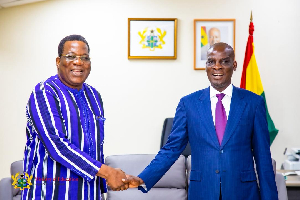By all means, it’s a good thing we are dancing to the song –it is good to be happy. Indeed, the song’s message appears largely, to be on something light and spicy: romance politics.
I really like the song. Once I got a Hausa woman to translate the very last line in verse 3: "abin daa di de, inna kyikin wan do”, I knew I would love the song forever –“the meal which is delicious can be found in the underpants.”
Yet, it could also be a metaphor for something weightier: it’s our lowest points that nurture us, it’s our sadness that matures us: “A moment of silence”
Our knees too, can be a storehouse for memory. Stonebwoy is a twin. There are things we believe about twins here: that at the very least, their souls reside in each other. Maybe fifteen years ago, while both he and his twin brother were still ‘little’, an “incident “, like he prefers to call it, happened. It was on the Tema motorway, and it was fatal; he lost his brother, Atsu. The situation ‘redesigned’ his walk through life, even literally. What happened cannot be forgotten, and his right knee won’t bend.
“Ever since I had an accident on the Tema motorway, my leg had [sic] never been perfect. But I said to myself, I will make it no matter the situation,” he told Live FM months ago. In other words:”No pill nor syrup k-yaan [can] cool I”
There’s something deeply emotional about the song, keep calm and listen: the saxophone at the beginning and indeed through the entire song, the terrifying organ, reminiscent of Nigerian epic movies, which themes the entire instrumental…the tempo even. Something definitely inspires a solemn mood in the song. Is it love? Is it undertones of sorrow? Is it peace?
Mightylele? What kind of word is that? We already have “dumsor” Do we need another word which we can either not mention or explain completely? Officially, the word is gibberish; it’s not in any dictionary yet. In fact, I imagine it was invented out of a romantic vapour and studio vibes (now I’m in trouble). But can gibberish ever make sense? Let’s explore, shall we?:
I like my interpretations of the word, and I believe (or at least hope) they are parallel to Stonebwoy’s intentions. Here’s one: Mightylele (noun): What we have witnessed can be heard in our voice, but we can surely determine the tone:
July 29, 2015, something wicked: Stonebwoy’s mum and spirit, Catherine Satekla, passes away at 37 Military after a short illness, and he misses her final moments closely; fifteen minutes.
Obviously, he was broken, because it was the worst time for something like that to happen: he was at his most successful –career-wise, and he was finally in the position to fulfil his childhood promises to her. “I had a lot of plans for her. I intended to do a lot for her because she was all I had”, he said in an interview shortly after it happened.
It is important that we mourn pain, but it is also important to find strength and rise, for we are angels to one another. Stonebwoy went ahead with the August 8 concert in her memory, and hasn’t stopped since. Of course he’s not made peace with it (no one can completely with a mum’s death), but it’s life, and in life, this is what you do:
“Deal wid it
Deal wid it
Deal wi di tin der Mightylele”
…Because, believe it or not, everybody has a low point we don’t know about. Everybody who has made it has had to overcome something, and there’s a good chance it’s worse than what we are “grappling” with. So in the wise words of Kofi Kinaata, the budding Fante rapper with refreshingly applicable lyrics, “susu ka”. It’s up to us to do something positive with it: “…telele telele, e be your own cargo”. Here’s something from verse 3:
“Take it away don’t let it go
Don’t fool your body
Don’t take it fi [for a] joke
Plug it in don’t cut off the flow
Like Kranium nobody haffi know o oo”
Keep calm and listen. In fact, many observe that it is out of these trials that happy endings come. No wonder Stonebwoy has such a big personality…no wonder he’s such a fearless vocal technician…because when we’ve been through our lowest, there’s nothing to lose. Bad times expose us to our fears and vulnerability, but once we’ve come to terms with our nakedness, no one can use it against us. That is courage. The great Maya Angelou is certain that we can’t do anything without courage.
Mightylele (adj): counting life’s many victories, no matter how little.
In fact, there’s no such thing as a “little” victory. A victory is a victory, and we should make a ceremony out of them all:
“When the body buck and shot
Make man no fit to walk pass
Say she go give you di [the] body o
She no want your money o
Dem dey think you be Yaro
But you carry auntie Caro”
Much like contemporary rappers do, the lyrics in the three verses of this song are not strict –they fidget around themes which, because of how they’ve been exposed to us in modern music, have become specifically unsurprising. There are (of course), lines on self-worship everywhere, even in circumstances of love and what a strong man (usually the rapper himself), can impress upon a woman’s carnality. It is usually confusing, even how they shuffle narrative points of view, till they find summary the chorus. In this song, it’s especially remarkable. The varied thoughts can wax into this one word: “Mightylele”, which we are still trying to make sense of.
This lyrical back and forth, the idea of many things happening all at once is the best portrait of what life is. One moment we are lost in sexual perversity and basking in carnal knowledge for sport, so we know we are doomed in our quest for true love:
“… ?be y? like it/ put inna her mouth and she waan [want] bite it”
Next minute, a woman we don’t deserve has chosen us:
“…say she go give you the body o/ she no want your money o”
But that’s life; nothing is disqualified from coming our way. We don’t decide what happens; only our response to it…and with the right mindset, “Dem dey think you be Yaro, but you carry Auntie Caro –mightylele”.
The song was produced by Beatz Dakay, who is immensely talented and has been Stonebwoy’s musical sidekick for a long while. It is no wonder their collaboration has been responsible for many of Stonebwoy’s most prominent offerings.
The song ends too soon, and we get that sense when he repeats the chorus in conclusion. We want him to say “…telele telele, e be your own cargo” at least one more time before the song ends. Yes, there’s an intro right after the solemn female voice requests a moment’s silence. The song stretches well beyond three minutes and is sang in three solid verses, but it’s still too short. Even if it were ten minutes long, it would still be too short to us….it’s that good.
It is simple, it feels dreamy and gentle. It is sensual, and ultimately, is the texture of soft fufu in ‘nkakra’.
This is the kind of song to reflect on, on a quiet Saturday afternoon, because it helps you notice beauty even in the movement of leaves on a mango tree. It makes you feel taller…and we all need to feel tall when we are down.
Stonebwoy walks for the pains which have built him, and lives for those he’s lost. But he walks for every one of us too, for he is a source of courage to anyone with ambitions and obstacles, and he better not give up.
Life is full of good. Every second, something of immense worth happens to us. Now, when we have lowered our fantastic ambitions and appreciated our everyday blessings, we are alive. When we have eventually realised that it is in the “little” incidents we are most blessed, then we can smile properly. For we are not merely mighty, we are….
Mightylele (noun): to live.
• Mightylele is an official single by multiple award-winning Afro-dancehall act, Livingstone “Stonebwoy” Etsey Satekla. It is also on most official top-ten charts in Ghana currently.
Music of Tuesday, 29 March 2016
Source: enewsgh.com













